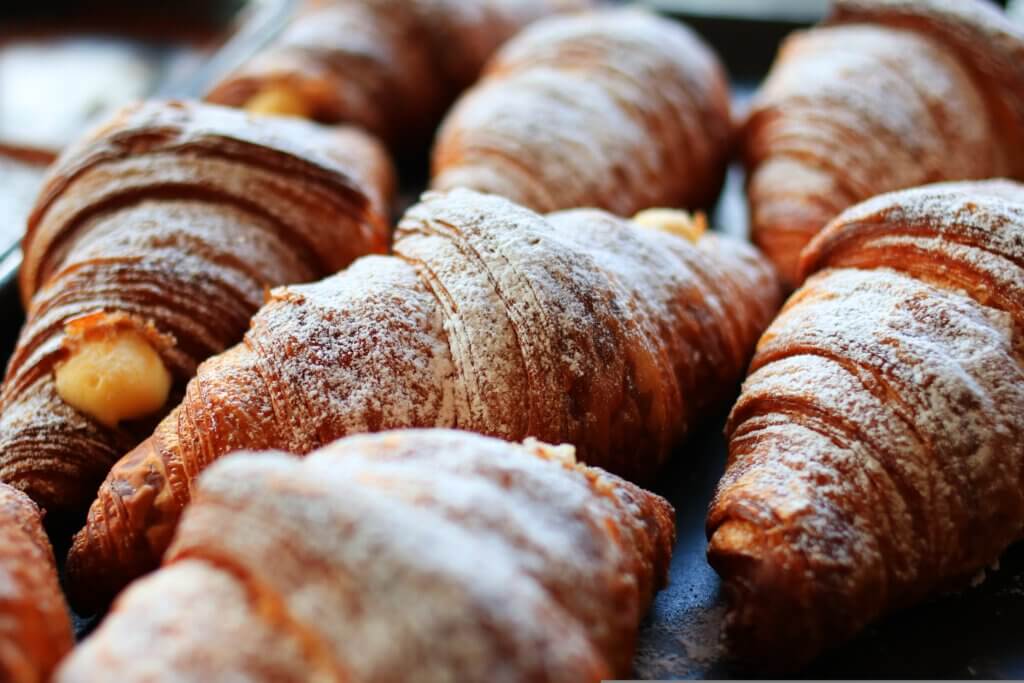
The energy crisis and rising prices are putting bakeries under pressure. With a trick, they are now fighting the decline in sales.
He needs three whole days for his croissants. “The most important thing is to get these shifts done,” baker Daniel Hächler told “SonntagsBlick“.
And the winner of the gold medal at the Swiss Bakery Trophy 2018 should know, after all, the baker from Seengen on Lake Hallwil in the canton of Aargau makes a living from it.
“The Swiss Gipfeli are a standard product,” he stressed in contrast. “They are less elaborate and are rolled by a machine,” he divulged. Croissants, which still contain about 10 percent more fat, are made by hand so that the layers are not crushed, he revealed to us.
Flowery words
But the butter and the dough must have the same consistency. However, they must not combine, his secrets continued. During baking, steam would then develop in the pastry; the fat layers would trap it and the pastry layers would separate. The whole becomes airy in this way and rises.
According to the information, a mass-produced croissant looks more compact on the inside. A traditional croissant is airier, fluffier, explained the master baker of his art, that readers will water in the mouth over.
Exodus of customers
But why does a baker currently make such statements? Clearly, in view of the energy crisis and rising inflation, more and more consumers are considering whether they should still buy from the traditional bakery or turn to the cheaper mass-produced goods in supermarkets or at gas stations.
“Croissant baking is about preserving those layers of buttery dough,” Hächler further explained. It’s about the flakiness, he said. In addition, he said, good butter is important. “Unfortunately, it’s not standard for bakers to work exclusively with butter,” the gourmet baker criticized. That’s why croissants cost more, the 34-year-old continued.
Cheaper competition
This is then the core of the story: Cheaper mass-produced goods from the wholesaler have never been touched by a hand, Hächler pointed out. They are also stored for a long time in a freezer and are then merely baked in a pre-programmed oven. It also has to have the right fat, i.e. a good butter.
When baking the Aargau croissant specialist also looks at energy use. “I currently heat the oven later so that it runs for less time,” he told the newspaper. But he needs electricity to bake. “What should I do?” the head of the traditional business, which has been in business since 1875, asked rhetorically.
Deliberately chosen
With the knowledge transfer the bakery trade tries to draw attention to the differences in its goods to the cheaper competition. Many industries do this and now the bakery trade is also using public product differentiation.
The newspaper “SonntagsBlick” was probably not chosen at random, because the readership probably has to watch the money more than other newspapers and is therefore more susceptible to product switching.
The tabloid even links a video and proclaims that these are the ‘best croissants in Switzerland.’ Other publications would certainly be more cautious in making such statements without a comprehensive market analysis.
Big players also affected
With all of this action, the baker from Aargau is bucking the trend of falling demand. This effect was also recently described by the baked goods group Aryzta and reported on by muula.ch.
A complete loss of demand for baked goods is unlikely, the management of the large bakery company had explained in the event of an economic downturn. Rather, consumers would cut back on luxury and demand fewer premium products, the reasoning has been.
Knowledge for laymen
The father of two children and boss of 40 employees from the canton of Aargau now impressively demonstrates in his interview that bakery croissants and frozen croissants come from two completely different product worlds. And the message is that the ingredients and the production process make it worthwhile to add money.
The absolute layman might not even have noticed the differences when biting into the pastry.
11/06/2022/kut./ena.





